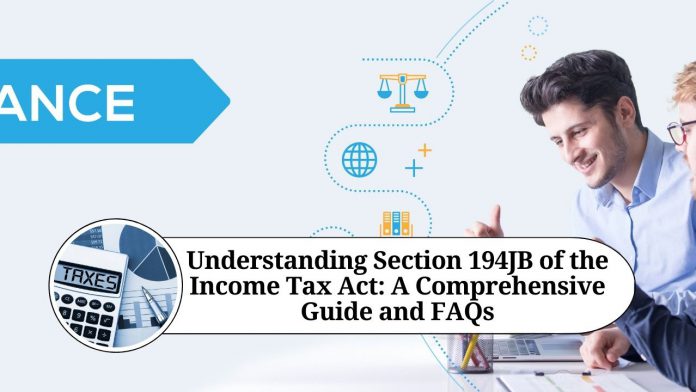Introduction:
Section 194JB was introduced under the Income Tax Act, 1961, as part of the Finance Act, 2017. This section deals with the taxation of the income distributed by a unit holder from a business trust or an investment fund to its investors. In this blog, we will discuss the provisions of section 194JB in detail.Applicability of Section 194JB: Section 194JB applies to all business trusts and investment funds registered under the Securities and Exchange Board of India (SEBI) regulations. It applies to any distribution made by such a trust or fund to its investors, which includes resident as well as non-resident investors.
Rate of Tax: The income distributed by a business trust or investment fund to its investors is taxed at the rate of 10%. This tax is deducted at source by the trust or fund at the time of distribution.Threshold Limit: There is no threshold limit for the application of section 194JB. This means that even if the distribution made by the trust or fund is small, tax will be deducted at source at the rate of 10%.
Exemptions: There are no exemptions under section 194JB. However, if the total income of the investor is below the basic exemption limit, the investor can claim a refund of the tax deducted at source by filing an income tax return.
Time of Deduction and Deposit: The tax deducted at source under section 194JB must be deposited with the government within 14 days from the end of the month in which the deduction is made. The trust or fund is also required to issue a certificate to the investor specifying the amount of income distributed and the tax deducted at source.
Conclusion:
Section 194JB was introduced to tax the income distributed by business trusts and investment funds to their investors. The tax is deducted at source at the rate of 10%, and there are no exemptions under this section. Although there is no threshold limit for the application of section 194JB, investors with a total income below the basic exemption limit can claim a refund of the tax deducted at source. It is important for investors to keep track of the income received from business trusts and investment funds and ensure that the tax deducted at source is deposited with the government within the prescribed time limit.
Other Related Blogs: Section 144B Income Tax Act
Frequently Asked Questions (FAQs)
Q: What is Section 194JB of the Income Tax Act? A: Section 194JB is a provision under the Income Tax Act, 1961 that deals with the taxation of income distributed by business trusts and investment funds to their investors.
Q: Who is liable to deduct tax under Section 194JB? A: Business trusts and investment funds registered under the SEBI regulations are liable to deduct tax under Section 194JB.
Q: What is the rate of tax under Section 194JB? A: The rate of tax under Section 194JB is 10%.
Q: Is there any threshold limit for the application of Section 194JB? A: No, there is no threshold limit for the application of Section 194JB.
Q: Are there any exemptions under Section 194JB? A: No, there are no exemptions under Section 194JB.
Q: Can a resident investor claim credit for tax deducted at source under Section 194JB? A: Yes, a resident investor can claim credit for tax deducted at source under Section 194JB while filing their income tax return.
Q: What is the time limit for depositing tax deducted at source under Section 194JB? A: The tax deducted at source under Section 194JB must be deposited with the government within 14 days from the end of the month in which the deduction is made.
Q: Can a non-resident investor claim a refund for tax deducted at source under Section 194JB? A: No, a non-resident investor cannot claim a refund for tax deducted at source under Section 194JB. However, they can claim credit for the same in their home country, subject to the provisions of the relevant double taxation avoidance agreement.
Q: What is the penalty for non-compliance with Section 194JB? A: The penalty for non-compliance with Section 194JB is 1% per month or part thereof on the amount of tax that was supposed to be deducted but was not deducted, or was deducted but not deposited.




















